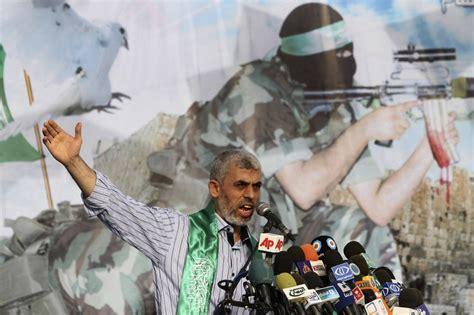
Hamas leader Yahya Sinwar is one of the world’s most wanted men, veteran Israeli journalist Ehud Yaari says he is in contact
It’s been nearly eight months since Yahya Sinwar was last seen in unverified CCTV footage released by the Israeli military, supposedly part of a small group passing through a tunnel deep beneath Khan Younis.
The man bringing up the rear in that footage certainly resembles Hamas’s leader in Gaza, one of the men responsible for the October 7 attacks.
He is the right age, has the same close cropped hair and wing-nut ears.
He disappears into the darkness, perhaps moving with his family to another hiding spot inside Gaza.
“What he wants is to be able to stop the Israeli offensive, pop up from the rubble, and say ‘I’m still here’,” says veteran Israeli political commentator Ehud Yaari.
“For him, this is victory.”
Few people have seen Sinwar since October 7, which makes Yaari’s next statement so incredible.
“I’m in indirect, let’s put it like this, communication with him,” Yaari told 7.30.
When asked how he is able to do so, he says contact is through an intermediary.
“Through one of his trusted assistants, who he sent outside Gaza before he attacked,” he said.
“I’m able to communicate with him, but it’s very erratic because it has to pass through a relay point.”
Yaari has known Sinwar for years, but thinks his role as a television commentator might have something to do with Sinwar’s motivation in communicating with him.
“He’s an addicted consumer of Israeli television broadcasts … during his years in prison and since he was released from prison. He knows me, and it was his choice,” he said.
‘Cunning and ruthless’
Sinwar was jailed for 22 years for orchestrating the murders of two Israelis and four Palestinians he suspected of collaborating with Israel. He learned Hebrew in prison and speaks the language fluently.
“I would say he’s the one Arab leader who spent more time than anyone else in trying to decipher his enemy,” Yaari said.
“Sinwar is a very cunning, shrewd, intelligent and ruthless person.”
Sinwar is one of three Hamas leaders named by ICC prosecutor Karim Khan as responsible for war crimes and crimes against humanity committed on October 7.
The others are Hamas’s political leader Ismail Haniyeh and military commander Mohammed Deif.
Khan says there are reasonable grounds to believe that Sinwar, Deif and Haniyeh are criminally responsible for the killing of hundreds of Israeli civilians on October 7 and the taking of at least 245 hostages.
Haniyeh is a figurehead who rose to the top of Hamas by default, after Israel killed the group’s founder, says Ghaith al-Omari, a former advisor to the Palestinian Authority, now with the Washington Institute.
“He was such a non-entity, that he was seen as unthreatening by all the different actors. And so that’s how he became the leader of the movement, almost by accident.”
Yaari concurs: “Sinwar is the only leader in Hamas that counts.”
Professor Menachem Klein says it’s likely Haniyeh and others outside Gaza knew an attack was imminent, but were not told the detail of what would happen on October 7.
“That the armed wing of Hamas was going to open a massive attack … inside Israel’s sovereign territories. This would have been made clear to them, I think two months before the attack,” Professor Klein said.
Yaari says that Deif — the other man named by the ICC’s Karim Khan — was “the legendary military hero of Hamas, originally the top commander, but he was injured severely by the Israelis”.
“Sinwar works through him,” Ghaith al-Omari said.
“Sinwar is the strategist but the one who actually conducts the military aspect of Hamas is Deif himself.”
Yaari says that Sinwar wants the war to end, and is willing to release the remaining hostages.
“His condition is that the Israeli army pulls out of Gaza completely [and] stops the offensive against Hamas,” Yaari told 7.30.
“And then, gradually, he will release the remainder of the hostages that are still alive.”
Victory for either side?
Professor Menachem Klein from Israel’s Bar-Ilan University says exchanging those hostages for Palestinian prisoners will allow Hamas to declare a victory.
“So by imposing on Israel, to exchange them with the hostages, the Hamas movement can show achievement for its people,” he said.
Professor Klein says the pragmatists within Hamas must now realise the limits of what is achievable.
“Hamas cannot destroy Israel,” he said.
“It may pray for that, it may be their wish that Israel will disappear, so what else, what now is achievable?
“There must be a way to bring political Hamas, demilitarised Hamas into the political game. This is the Palestinian Authority’s attitude. Otherwise, Hamas will sabotage any attempt to normalise civil life in the Gaza Strip.”
Israeli Prime Minister Benjamin Netanyahu has said he wants “total victory” over Hamas in Gaza; Yaari says that is unlikely.
“But what is total victory? How does it look? You’re going to kill each and every one of the 40,000 strong Hamas and Islamic Jihad? You’re not. So Hamas will remain an armed underground,” Yaari said.
If they do al-Omari says it is difficult to see Hamas having a post-war role as leaders in Palestine while Sinwar remains at large.
“As long as he is in charge, he will be a symbol that violence and terror actually produces political results,” al-Omari said.
“Someone like him has to be out of the picture.”
Source » abc.net.au





